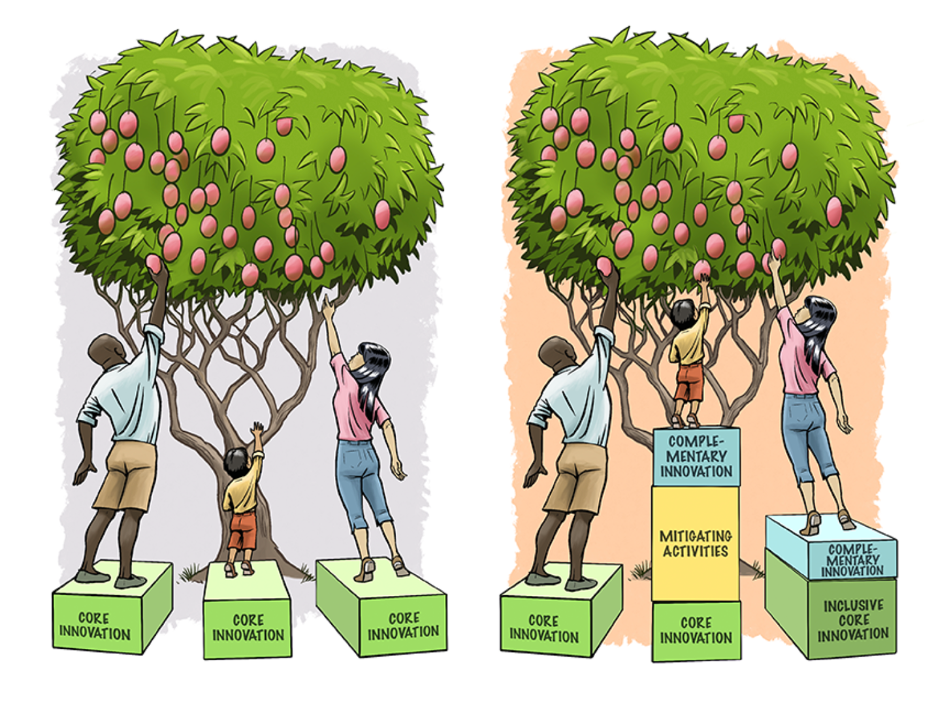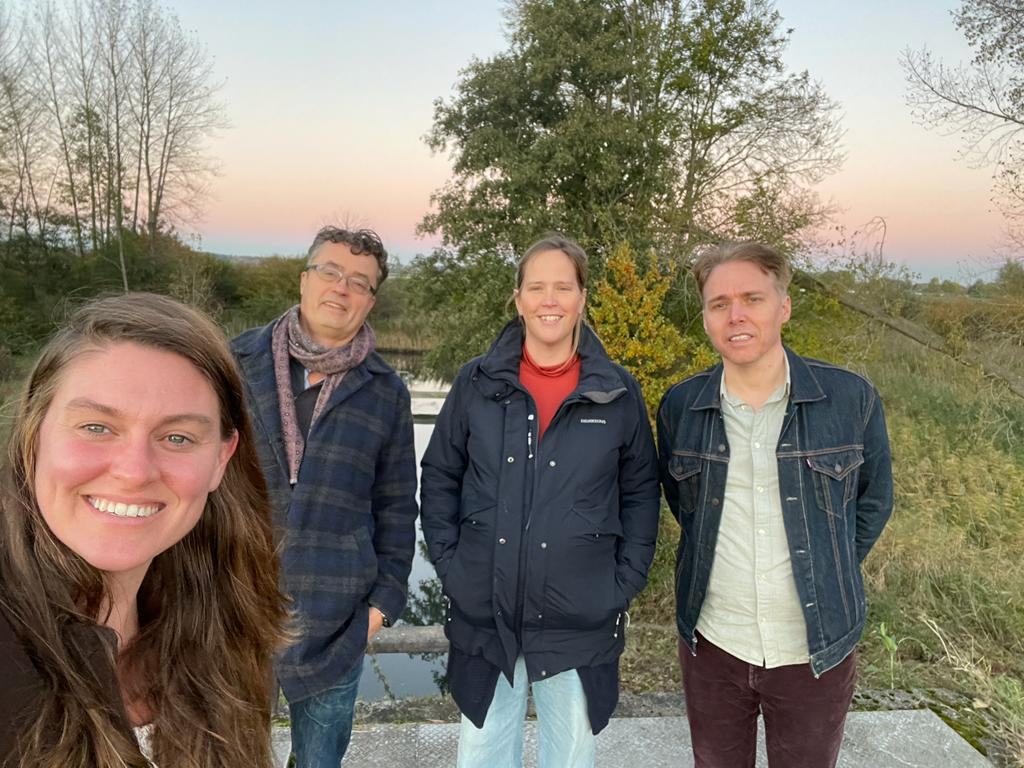Blog GenderUp! Because readiness is not enough when scaling for impact

By: Anne Rietveld
‘Achieving impact’ is what motivates many researchers working in and with the CGIAR. And so, we develop innovations that have the potential to contribute to development outcomes such as food security or climate adaptation. Once successfully tested and perhaps adopted on a small scale, such innovations need to go ‘to scale’ to achieve the desired impact(s). Scaling is not necessarily easy though. We all know about innovations which we thought would change the world, that failed to go to scale. And then there are innovations that did change the world but in ways we did not foresee nor desire, with negative consequences and impacts such as land degradation or increased (gender) inequality overshadowing the impacts that were originally strived for.
What to do? How to scale better?
Continue reading to learn about a new tool – GenderUp – a conversational method which supports inclusive and responsible scaling of innovations in Food, Land and Water systems. Cees Leeuwis (Professor, Wageningen University and Research) explains why he encourages the use of this method and Sarah Mayanja (Gender Researcher, CIP) shares her experience using GenderUp to scale potato seed innovations in Ethiopia. Teams that want to improve their capacity in gender-responsive and responsible scaling of innovations, can now sign up!
Several approaches were developed to guide scaling of agricultural innovations over the past years. ‘The Scaling Scan’ was for instance developed by a team of CIMMYT, and the CRP on Roots Tubers and Bananas funded the development of ‘Scaling Readiness’. Gender researchers pointed out that these approaches are useful but also blind to gender and other dimensions of diversity. In addition, possible negative consequences of scaling are hardly considered. In response to this criticism, CRP-RTB funded a multidisciplinary project co-led by Cees Leeuwis (Wageningen Universiteit) and Anne Rietveld (Alliance of Bioversity-CIAT), which brought together members of the scaling readiness and the gender team. Together, they developed the GenderUp method for responsible scaling.
GenderUp is based on the idea that, when scaling for impact, it is critical to consider how innovations affect and will benefit (or not) different groups of people. GenderUp enables scaling teams to systematically explore the diversity amongst potential users of an innovation and effects of (massive) use of the innovation on both users and non-users. Gender is a key dimension of diversity in GenderUp but other dimensions of diversity such as age, wealth, and education (and whatever is relevant in a particular context) and how they intersect with gender, are explored as well. The tool can be used together with Scaling Readiness, and like this approach, GenderUp understands an innovation to scale as part of a package with supporting or complementary socio-organizational and institutional innovations. Through facilitated conversation GenderUp explicates why some social groups may not benefit from an innovation in the same way as others. Scaling teams can then adjust their strategy and/or elements of the innovation package. When expected effects are mainly negative or very risky, they might decide not to scale the innovation at all. Cees Leeuwis (WUR) explains,
“Having a systematic conversation about how scaling of innovations may affect different groups in society is critically important; it serves as an eye-opener and can help to ensure that innovation packages and scaling strategies become more aligned to groups that are easily excluded. A method for guiding such discussions was really missing!”

Sarah Mayanja (gender researcher, CIP) was part of one of the first teams that tried out GenderUp. This team worked on seed potato value chains in Ethiopia and had developed several technologies and value chain innovations they were eager to scale out. They were aware though of disparities between women and men regarding accessing and using these innovations which triggered their interest in testing GenderUp. According to Sarah, GenderUp enabled the project team to define several intersectional gender groups of potential users in the project intervention areas. And to elaborate on the required inputs, trainings, communication approaches and scaling partners needed to reach these groups in an improved scaling strategy. Sarah further states that:
“The improved scaling strategy will be useful for designing future projects and development interventions as well, as we can use, adapt and build on these user profiles”.
A GenderUp ‘journey’ consists of three workshops of 2-3 hours which should be held within a period of about 2-6 weeks. In between workshop 1 and 2 scaling team members fill in a survey about the core innovation and scaling ambition. The workshops are facilitated by a trained GenderUp facilitator. Workshops can be organized both in-person or virtual. The scaling team should ideally bring together scientists or other stakeholders in scaling the innovation with various disciplinary backgrounds.

The GenderUp core design team from left to right: Erin McGuire (UcDavis); Cees Leeuwis (WUR); Anne Rietveld (Alliance Bioversity-CIAT) and Bela Teeken (IITA)
The GenderUp team is currently working to promote GenderUp within and outside the CGIAR. GenderUp will for instance be presented at ‘A week of science and practice of scaling agri-food system innovation’ which is taking place in Nairobi between 22-24 November 2022 and is jointly organized by the CGIAR scaling community, IITA, GIZ and the CGIAR initiative on East and Southern Africa Ukama Ustawi.
There is an opportunity now to learn how to facilitate a GenderUp journey. Two separate trainings for prospective GenderUp facilitators are planned on December 14th (CET time zone, in English), and 15th (PST time zone and in English / Spanish), 2022. We encourage staff with ‘scaling’ ambitions and objectives to sign up for this one-day training. The training is particularly geared towards people who have a social science background and (at least) a basic understanding of gender and intersectionality in food systems.
Register for the GenderUp facilitator training now by filling in this registration form!
For more information on the GenderUP facilitator training please email: [email protected]
For more information on using GenderUp please email (within the CGIAR): Anne Rietveld ([email protected]) or (external to the CGIAR): Erin Mcguire ([email protected])
Funding acknowledgement: The development of GenderUp was undertaken as part of, and funded by, the CGIAR Research Program on Roots, Tubers and Bananas (RTB) and supported by CGIAR Trust Fund contributors. Funding support was provided by the Netherlands – CGIAR Expert Programme funded through NWO.
